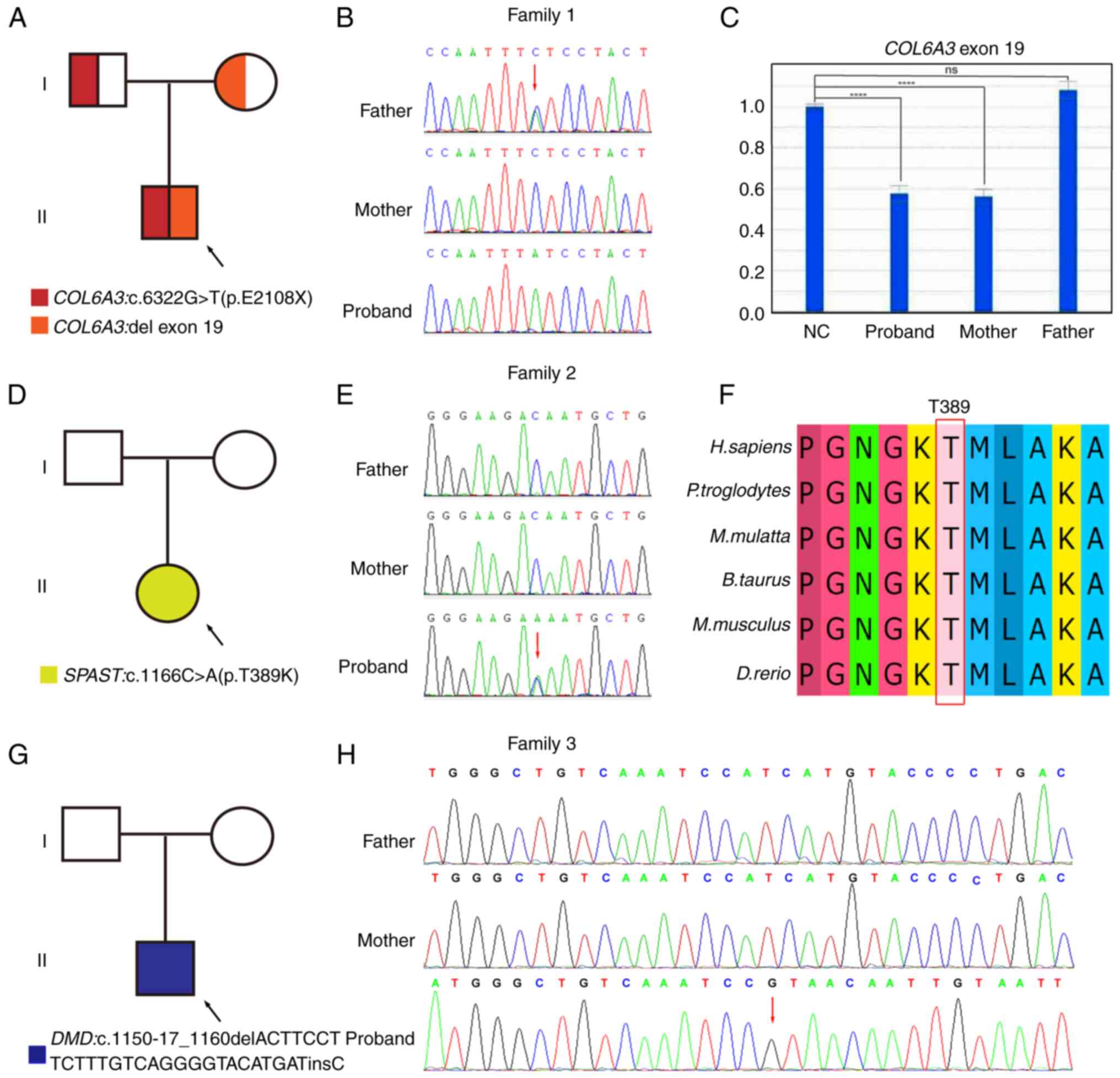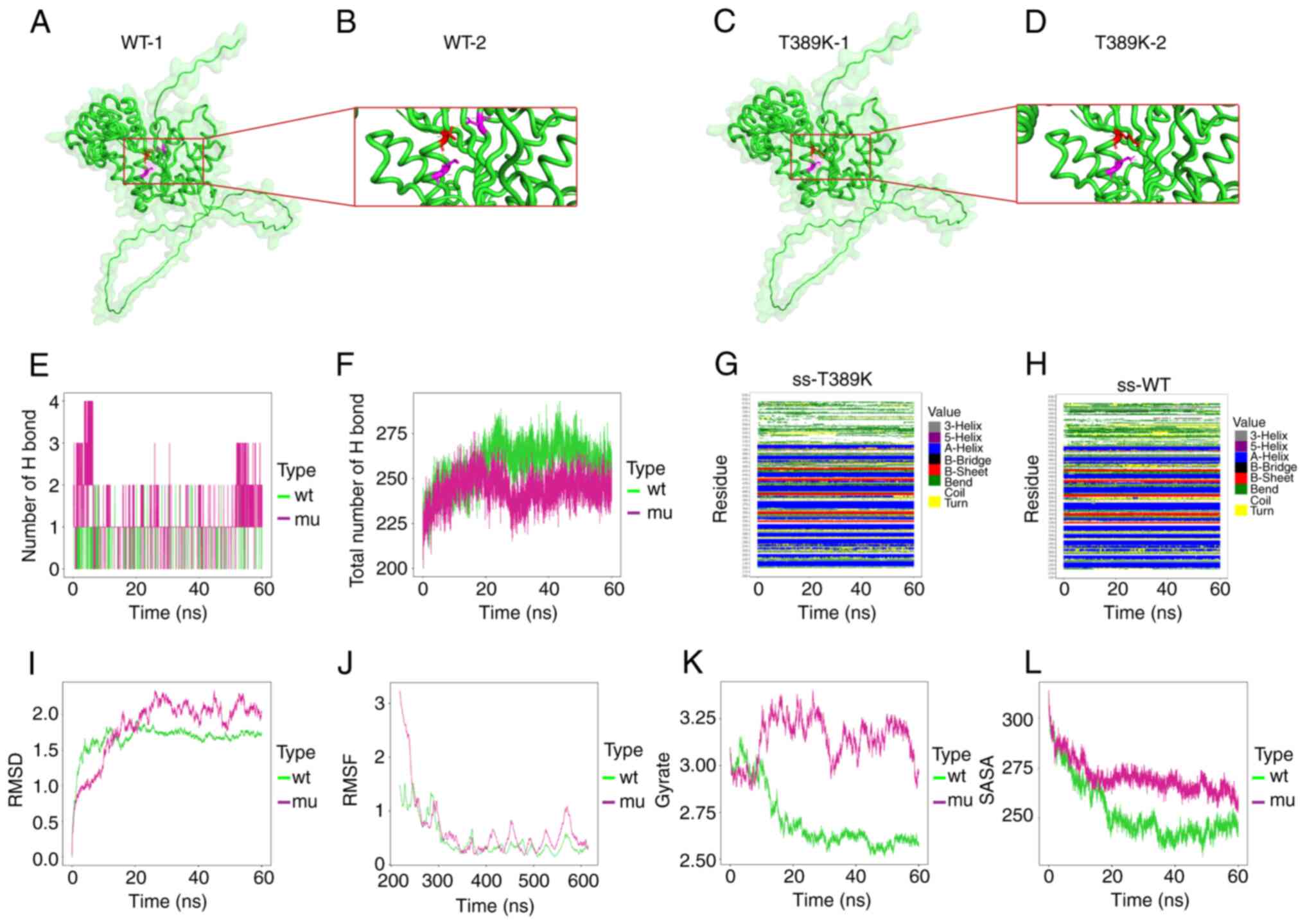|
1
|
Dowling JJ, Weihl CC and Spencer MJ:
Molecular and cellular basis of genetically inherited skeletal
muscle disorders. Nat Rev Mol Cell Biol. 22:713–732.
2021.PubMed/NCBI View Article : Google Scholar
|
|
2
|
Koenig M, Hoffman EP, Bertelson CJ, Monaco
AP, Feener C and Kunkel LM: Complete cloning of the Duchenne
muscular dystrophy (DMD) cDNA and preliminary genomic organization
of the DMD gene in normal and affected individuals. Cell.
50:509–517. 1987.PubMed/NCBI View Article : Google Scholar
|
|
3
|
Butterfield RJ: Congenital muscular
dystrophy and congenital myopathy. Continuum (Minneap Minn).
25:1640–1661. 2019.PubMed/NCBI View Article : Google Scholar
|
|
4
|
Foley AR, Mohassel P, Donkervoort S,
Bolduc V and Bönnemann CG: Collagen VI-related dystrophies. In:
GeneReviews® [Internet]. Adam MP, Feldman J, Mirzaa GM,
Pagon RA, Wallace SE, Bean LH, Gripp KW and Amemiya A (eds).
University of Washington, Seattle, WA, 1993.
|
|
5
|
Pepea G, Bertini E, Bonaldo P, Bushby K,
Giusti B, de Visser M, Guicheney P, Lattanzi G, Merlini L, Muntoni
F, et al: Bethlem myopathy (BETHLEM) and Ullrich scleroatonic
muscular dystrophy: 100th ENMC international workshop, 23-24
November 2001, Naarden, The Netherlands. Neuromuscul Disord.
12:984–993. 2002.PubMed/NCBI View Article : Google Scholar
|
|
6
|
Briñas L, Richard P, Quijano-Roy S,
Gartioux C, Ledeuil C, Lacène E, Makri S, Ferreiro A, Maugenre S,
Topaloglu H, et al: Early onset collagen VI myopathies: Genetic and
clinical correlations. Ann Neurol. 68:511–520. 2010.PubMed/NCBI View Article : Google Scholar
|
|
7
|
Bönnemann CG: The collagen VI-related
myopathies: Muscle meets its matrix. Nat Rev Neurol. 7:379–390.
2011.PubMed/NCBI View Article : Google Scholar
|
|
8
|
Allamand V, Merlini L and Bushby K:
Consortium for Collagen VI-Related Myopathies. 166th ENMC
international workshop on collagen type VI-related myopathies,
22-24 May 2009, Naarden, The Netherlands. Neuromuscul Disord.
20:346–354. 2010.PubMed/NCBI View Article : Google Scholar
|
|
9
|
Allamand V, Briñas L, Richard P, Stojkovic
T, Quijano-Roy S and Bonne G: ColVI myopathies: Where do we stand,
where do we go? Skelet Muscle. 1(30)2011.PubMed/NCBI View Article : Google Scholar
|
|
10
|
Foley AR, Hu Y, Zou Y, Columbus A,
Shoffner J, Dunn DM, Weiss RB and Bönnemann CG: Autosomal recessive
inheritance of classic Bethlem myopathy. Neuromuscul Disord.
19:813–817. 2009.PubMed/NCBI View Article : Google Scholar
|
|
11
|
Zamurs LK, Idoate MA, Hanssen E,
Gomez-Ibañez A, Pastor P and Lamandé SR: Aberrant mitochondria in a
Bethlem myopathy patient with a homozygous amino acid substitution
that destabilizes the collagen VI α2(VI) chain. J Biol Chem.
290:4272–4281. 2015.PubMed/NCBI View Article : Google Scholar
|
|
12
|
Camacho Vanegas O, Bertini E, Zhang RZ,
Petrini S, Minosse C, Sabatelli P, Giusti B, Chu ML and Pepe G:
Ullrich scleroatonic muscular dystrophy is caused by recessive
mutations in collagen type VI. Proc Natl Acad Sci USA.
98:7516–7521. 2001.PubMed/NCBI View Article : Google Scholar
|
|
13
|
Hedera P: Hereditary spastic paraplegia
overview. In: GeneReviews® [Internet]. Adam MP, Feldman
J, Mirzaa GM, Pagon RA, Wallace SE, Bean LJ, Gripp KW and Amemiya A
(eds). University of Washington, Seattle, WA, 1993.
|
|
14
|
Parodi L, Rydning SL, Tallaksen C and Durr
A: Spastic paraplegia 4. In: GeneReviews® [Internet].
Adam MP, Feldman J, Mirzaa GM, Pagon RA, Wallace SE, Bean LJ, Gripp
KW and Amemiya A (eds). University of Washington, Seattle, WA,
1993.
|
|
15
|
Erichsen AK, Koht J, Stray-Pedersen A,
Abdelnoor M and Tallaksen CM: Prevalence of hereditary ataxia and
spastic paraplegia in southeast Norway: A population-based study.
Brain. 132:1577–1588. 2009.PubMed/NCBI View Article : Google Scholar
|
|
16
|
Fei QZ, Tang WG, Rong TY, Tang HD, Liu JR,
Guo ZL, Fu Y, Xiao Q, Wang XJ, He SB, et al: Two novel mutations in
the Spastin gene of Chinese patients with hereditary spastic
paraplegia. Eur J Neurol. 18:1194–1196. 2011.PubMed/NCBI View Article : Google Scholar
|
|
17
|
Ruano L, Melo C, Silva MC and Coutinho P:
The global epidemiology of hereditary ataxia and spastic
paraplegia: A systematic review of prevalence studies.
Neuroepidemiology. 42:174–183. 2014.PubMed/NCBI View Article : Google Scholar
|
|
18
|
Parodi L, Fenu S, Barbier M, Banneau G,
Duyckaerts C, Tezenas du Montcel S, Monin ML, Ait Said S, Guegan J,
Tallaksen CME, et al: Spastic paraplegia due to SPAST mutations is
modified by the underlying mutation and sex. Brain. 141:3331–3342.
2018.PubMed/NCBI View Article : Google Scholar
|
|
19
|
Méreaux JL, Banneau G, Papin M, Coarelli
G, Valter R, Raymond L, Kol B, Ariste O, Parodi L, Tissier L, et
al: Clinical and genetic spectra of 1550 index patients with
hereditary spastic paraplegia. Brain. 145:1029–1037.
2022.PubMed/NCBI View Article : Google Scholar
|
|
20
|
Darras BT, Urion DK and Ghosh PS:
Dystrophinopathies. 2000 Sep 5 (Updated 2022 Jan 20). In: Adam MP,
Feldman J, Mirzaa GM, Pagon RA, Wallace SE, Bean LJ, Gripp KW and
Amemiya A (eds). GeneReviews® [Internet]. Seattle (WA):
University of Washington, Seattle, 1993.
|
|
21
|
Flanigan KM: Duchenne and Becker muscular
dystrophies. Neurol Clin. 32:671–688, viii. 2014.PubMed/NCBI View Article : Google Scholar
|
|
22
|
Zhang J, Hu H, Mu W, Yu M, Chen W, Mi D,
Yang K and Guo Q: Case report: Exome sequencing identified a novel
compound heterozygous variation in PLOD2 causing bruck syndrome
type 2. Front Genet. 12(619948)2021.PubMed/NCBI View Article : Google Scholar
|
|
23
|
Huang YX, Gao CY, Zheng CY, Chen X, Yan
YS, Sun YQ, Dong XY, Yang K and Zhang DL: Investigation of a novel
LRP6 variant causing autosomal-dominant tooth agenesis. Front
Genet. 12(688241)2021.PubMed/NCBI View Article : Google Scholar
|
|
24
|
Yang F, Yang RJ, Li Q, Zhang J, Meng YX,
Liu XJ and Yao YF: Whole-exome sequencing facilitates the
differential diagnosis of Ehlers-Danlos syndrome (EDS). Mol Genet
Genomic Med. 10(e1885)2022.PubMed/NCBI View Article : Google Scholar
|
|
25
|
Richards S, Aziz N, Bale S, Bick D, Das S,
Gastier-Foster J, Grody WW, Hegde M, Lyon E, Spector E, et al:
Standards and guidelines for the interpretation of sequence
variants: A joint consensus recommendation of the American college
of medical genetics and genomics and the association for molecular
pathology. Genet Med. 17:405–424. 2015.PubMed/NCBI View Article : Google Scholar
|
|
26
|
Livak KJ and Schmittgen TD: Analysis of
relative gene expression data using real-time quantitative PCR and
the 2(-Delta Delta C(T)) method. Methods. 25:402–408.
2001.PubMed/NCBI View Article : Google Scholar
|
|
27
|
Rakhshani H, Dehghanian E and Rahati A:
Enhanced GROMACS: Toward a better numerical simulation framework. J
Mol Model. 25(355)2019.PubMed/NCBI View Article : Google Scholar
|
|
28
|
Soteras Gutiérrez I, Lin FY,
Vanommeslaeghe K, Lemkul JA, Armacost KA, Brooks CL III and
MacKerell AD Jr: Parametrization of halogen bonds in the CHARMM
general force field: Improved treatment of ligand-protein
interactions. Bioorg Med Chem. 24:4812–4825. 2016.PubMed/NCBI View Article : Google Scholar
|
|
29
|
Pelin K and Wallgren-Pettersson C: Update
on the genetics of congenital myopathies. Semin Pediatr Neurol.
29:12–22. 2019.PubMed/NCBI View Article : Google Scholar
|
|
30
|
Scoto M, Finkel R, Mercuri E and Muntoni
F: Genetic therapies for inherited neuromuscular disorders. Lancet
Child Adolesc Health. 2:600–609. 2018.PubMed/NCBI View Article : Google Scholar
|
|
31
|
Gualandi F, Urciuolo A, Martoni E,
Sabatelli P, Squarzoni S, Bovolenta M, Messina S, Mercuri E,
Franchella A, Ferlini A, et al: Autosomal recessive Bethlem
myopathy. Neurology. 73:1883–1891. 2009.PubMed/NCBI View Article : Google Scholar
|
|
32
|
Armaroli A, Trabanelli C, Scotton C,
Venturoli A, Selvatici R, Brisca G, Merlini L, Bruno C, Ferlini A
and Gualandi F: Paternal germline mosaicism in collagen VI related
myopathies. Eur J Paediatr Neurol. 19:533–536. 2015.PubMed/NCBI View Article : Google Scholar
|
|
33
|
Chen GL and Li DZ: Germline mosaicism in a
collagen VI-related myopathy family: A cause of autosomal recessive
inheritance. Congenit Anom (Kyoto). 61:197–198. 2021.PubMed/NCBI View Article : Google Scholar
|
|
34
|
Inoue M, Saito Y, Yonekawa T, Ogawa M,
Iida A, Nishino I and Noguchi S: Causative variant profile of
collagen VI-related dystrophy in Japan. Orphanet J Rare Dis.
16(284)2021.PubMed/NCBI View Article : Google Scholar
|
|
35
|
Varghaei P, Estiar MA, Ashtiani S, Veyron
S, Mufti K, Leveille E, Yu E, Spiegelman D, Rioux MF, Yoon G, et
al: Genetic, structural and clinical analysis of spastic paraplegia
4. Parkinsonism Relat Disord. 98:62–69. 2022.PubMed/NCBI View Article : Google Scholar
|
|
36
|
Orlacchio A, Kawarai T, Totaro A, Errico
A, St George-Hyslop PH, Rugarli EI and Bernardi G: Hereditary
spastic paraplegia: Clinical genetic study of 15 families. Arch
Neurol. 61:849–855. 2004.PubMed/NCBI View Article : Google Scholar
|
|
37
|
Giordani GM, Diniz F, Fussiger H,
Gonzalez-Salazar C, Donis KC, Freua F, Ortega RPM, de Freitas JL,
Barsottini OGP, Rosemberg S, et al: Clinical and molecular
characterization of a large cohort of childhood onset hereditary
spastic paraplegias. Sci Rep. 11(22248)2021.PubMed/NCBI View Article : Google Scholar
|
|
38
|
Piermarini E, Akarsu S, Connors T,
Kneussel M, Lane MA, Morfini G, Karabay A, Baas PW and Qiang L:
Modeling gain-of-function and loss-of-function components of
SPAST-based hereditary spastic paraplegia using transgenic mice.
Hum Mol Genet. 31:1844–1859. 2022.PubMed/NCBI View Article : Google Scholar
|
|
39
|
Karle KN, Schüle R, Klebe S, Otto S,
Frischholz C, Liepelt-Scarfone I and Schöls L: Electrophysiological
characterisation of motor and sensory tracts in patients with
hereditary spastic paraplegia (HSP). Orphanet J Rare Dis.
8(158)2013.PubMed/NCBI View Article : Google Scholar
|
|
40
|
Costa AC and Sousa MM: The role of spastin
in axon biology. Front Cell Dev Biol. 10(934522)2022.PubMed/NCBI View Article : Google Scholar
|
|
41
|
Liu Q, Zhang G, Ji Z and Lin H: Molecular
and cellular mechanisms of spastin in neural development and
disease (Review). Int J Mol Med. 48(218)2021.PubMed/NCBI View Article : Google Scholar
|
|
42
|
Aartsma-Rus A, Van Deutekom JC, Fokkema
IF, Van Ommen GJ and Den Dunnen JT: Entries in the Leiden Duchenne
muscular dystrophy mutation database: An overview of mutation types
and paradoxical cases that confirm the reading-frame rule. Muscle
Nerve. 34:135–144. 2006.PubMed/NCBI View Article : Google Scholar
|
|
43
|
Monaco AP, Bertelson CJ, Liechti-Gallati
S, Moser H and Kunkel LM: An explanation for the phenotypic
differences between patients bearing partial deletions of the DMD
locus. Genomics. 2:90–95. 1988.PubMed/NCBI View Article : Google Scholar
|
|
44
|
Ioannidis NM, Rothstein JH, Pejaver V,
Middha S, McDonnell SK, Baheti S, Musolf A, Li Q, Holzinger E,
Karyadi D, et al: REVEL: An ensemble method for predicting the
pathogenicity of rare missense variants. Am J Hum Genet.
99:877–885. 2016.PubMed/NCBI View Article : Google Scholar
|

















